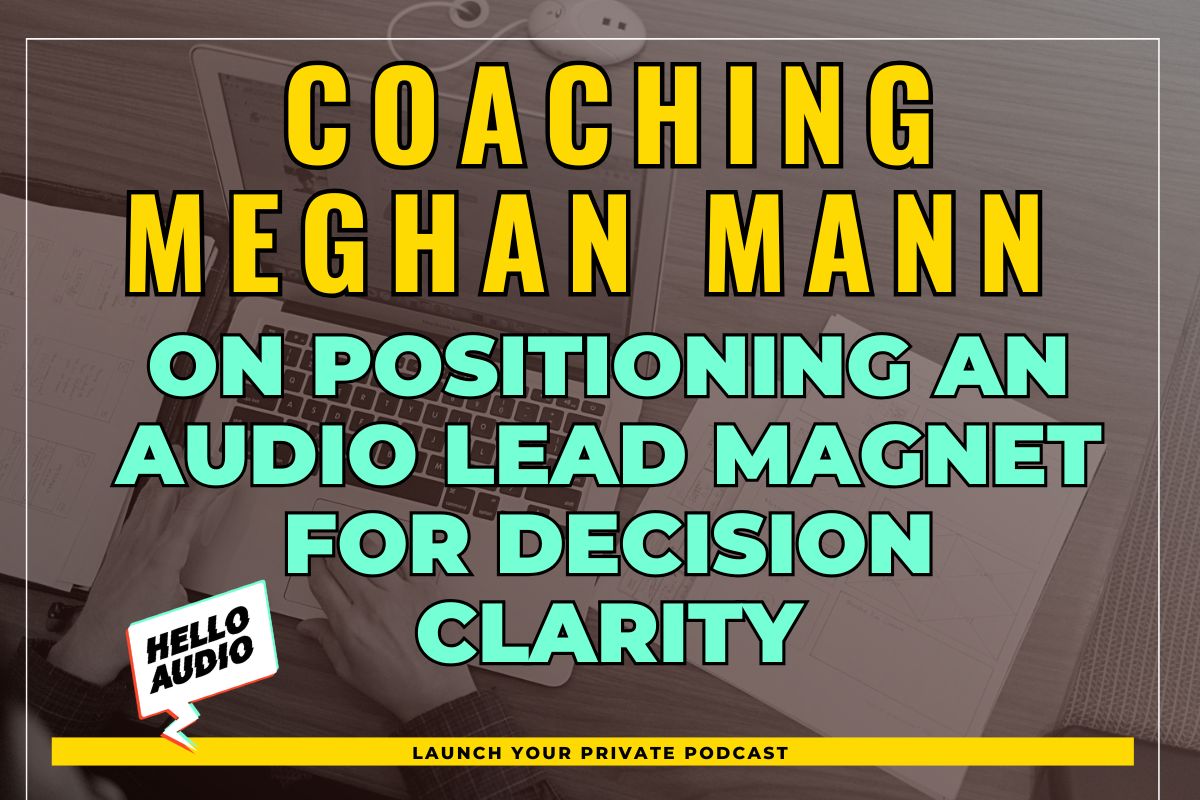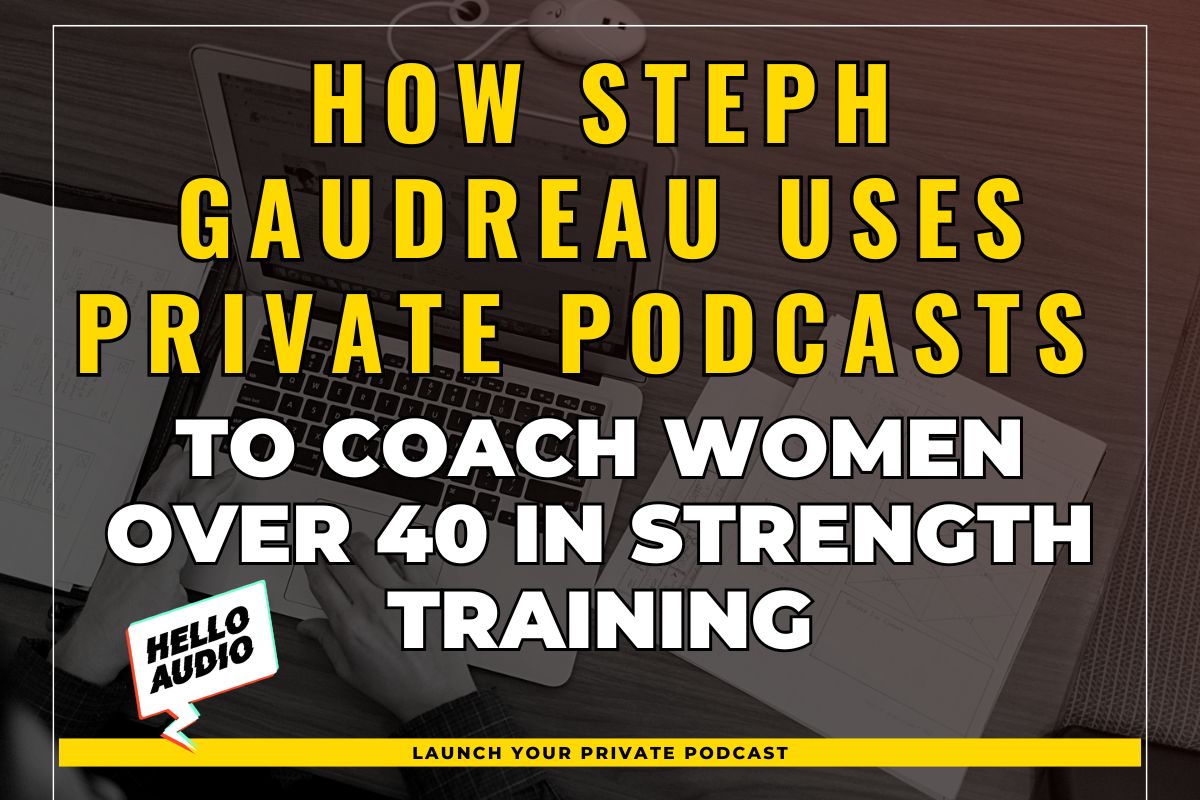Are you new to planning events, or is it your hundredth and looking for an easy process to follow when planning your event?
Stay on top of your game with our virtual event best practices and a comprehensive checklist outlining every detail needed to plan a successful virtual event.
Want to reach your listeners even after the event is done?
Whether it’s a virtual training program, a digital course, a webinar, or even a TikTok live video, you can convert any existing virtual event recordings into private podcasts using Hello Audio and allow your audience to listen on the go.
The cherry on top — you can measure listener analytics and manage access anytime.
Try our 7-day free trial to build and nurture an active online community.

What Is a Virtual Event?
A virtual event is fundamentally what it sounds like.
It’s an online gathering where you can gather your audience to entertain them, teach them a skill, or build a community online rather than in-person.
Types of Virtual Events
So, what are the common virtual events to consider?
Let’s go over some of them:
- Online Trade Shows: Hold an online trade show and expo to showcase your offerings. Your attendees can gather insightful product information through the virtual exhibit halls.
- Webinars: Hold an online webinar with a speaker or panel of experts to interact with your audience and provide information on a topic.
- Virtual Conferences: You can hold interactive virtual events (often large) and bring people together to learn, share knowledge, and network.
- Networking Events: Like other online community sites, you can hold an online networking event to provide opportunities for enhancing engagement, building connections, and facilitating interactions between attendees.
- Concerts: If you’re an artist, you can break location barriers and host virtual concerts, which offer a fresh perspective of live performances. A great example is Tiny Desk Concerts.
- Training Sessions: You can set up training sessions, from employee onboarding to traditional education programs (and more) or interacting with students.
- Job Fairs: From the comfort of their home, potential candidates can learn more about the roles in your company while allowing recruiters to interact with them effectively.
- Virtual Workshops: To help your participants achieve desired results, you can hold classroom-style online sessions for training and professional development.
- Virtual Product Launch: Launching a new offering? A virtual product launch is a fantastic way to reach a wide audience, increase brand awareness, and drive engagement.
- Summits: If you’re a thought leader or an expert in a particular industry, you can teach and share knowledge with an audience based on their needs.

The Importance of Virtual Events in Today’s Digital Landscape
So, why should you host an interactive virtual event in the first place?
There are many reasons why virtual events have become a powerful tool for businesses. Check out the top 5 benefits:
1. Opportunities for Content Creation
One standout benefit of virtual events is that you can convert your recorded sessions into blog posts, video clips, or podcasts to connect with your audience even after the event.
Hello Audio lets you instantly create private podcasts from your virtual events. Our tool also automatically transcribes audio, creates members-only private audio feeds, and monitors listener engagement data.
Don’t just take our word for it!
Check out our success stories of clients who have used private podcasts to build an online community, drive engagement, and generate revenue from their events.
For example, Angie Jordan used our tool to create private podcasts and sold out her launch in three days.
2. Accessibility
Unlike in-person events, your virtual show isn’t limited by space or time. It enables you to reach more people, regardless of their location and accessibility.
Your audience can join from anywhere worldwide, anytime, and on any device.
3. Cost Effective
With virtual live events, you can leverage digital and social media platforms to reach your target audience, making these events more budget-friendly.
You won’t incur expenses like travel, venue costs, printing materials, or marketing merchandise.
4. Increase Brand Awareness
Virtual events are significant for expanding your business reach, networking with potential customers, and driving traffic to your brand.
Ultimately, the event leads to valuable partnerships and new clients, even from locations far from your business.
5. Track Analytics and Performance
Virtual events provide detailed data on your attendees’ behavior and engagement.
With this data, you can calculate the event’s effectiveness and build personalized campaigns to nurture leads down the sales funnel.

How to Plan a Virtual Event
Need help planning your virtual event?
Check out our checklist for more in-depth guidance:
Pre-Event: Virtual Event Planning Checklist
So, what should you do before your event?
Here’s a pre-event checklist to keep in mind as you conceptualize your event:
- Establish Your Goals: What is the purpose of hosting your event? Set clear goals to be the foundation of your entire virtual event strategy.
- Define Your Target Audience: Identify and segment your audience based on their demographics, preferences, and needs to craft content and promotion strategy that appeals to them.
- Decide on a Type of Virtual Event: Depending on your goals, your virtual event can be a webinar, conference, workshop, or training session.
- Choose a Virtual Event Platform: When choosing a digital event platform, ensure it aligns with your goals and type of event. Consider features such as gamification, networking spaces, and exhibition halls.
During the Event: Engagement and Execution
It’s time to start executing!
During the event, you should:
- Engage the Audience: As your audience’s attention span shrinks, use gamification, polls, and Q&As to keep them engaged.
- Moderate Sessions: Remember to do online community moderation. You can appoint one person to introduce speakers, guide discussion, and facilitate participants’ interactions throughout the event.
- Encourage Networking: Encourage attendees to network by creating opportunities such as organizing 1:1 appointments and break-out sessions.
- Collect Data: Remember to track the focus time and attendance rate. You can use the data later to improve strategies for your next event.
- Prepare for Troubleshooting: While last-minute glitches can be avoided through proper planning, you should expect anything and prepare for quick troubleshooting.
Post-Event Follow-Up and Analysis
An often overlooked stage is post-event follow-up.
Here is a checklist to guide you:
- Follow Up with Guests: Send out a post-event survey to measure the success of your virtual event. A simple thank you note with a feedback survey lets attendees know you appreciate their time.
- Analyze Data: Based on your KPIs, you can analyze data to measure your success and identify opportunities for improving your virtual event strategy.
- Share Results with Stakeholders: Gather your event’s data and present it to your sponsors and partners in an easy-to-understand way.

Best Practices for Hosting a Successful Virtual Event
In addition to the checklist, here are extra tips to make your virtual event successful:
Create a Seamless Attendee Experience
The attendees prioritize a seamless experience. So, make it easy for your audience to sign up, make payments, and attend your event. You can pick the best virtual event platform that meets your needs.
Craft a Virtual Event Strategy
Without a clear strategy, you may lose sight of your goals.
A strategy maps out the entire virtual event process from beginning to post-event, helping you outline critical aspects like virtual event marketing tactics and audience research.
Promote Your Event
You’ve organized your virtual event, but how do you get noticed?
You can create exciting event landing pages, develop email marketing campaigns, share your event on social platforms, and optimize your event page.
Repurpose Your Event
Just because your event is over doesn’t mean you should stop there. Segment all registrants into attended and not attended and send out post-event emails.
Besides, use our platform to turn your virtual events into private podcasts, making them accessible to those who did not attend. Check out our instant demo to see all our features in action.

Frequently Asked Questions (FAQs)
Got more questions?
Check out these answers to frequently asked questions.
How Do I Choose the Right Platform for My Virtual Event?
Consider the following factors before deciding which virtual event platform to invest in:
- Budget-friendly pricing: Find a solution that fits within your budget.
- Analytical tools: Ensure the platform has robust analytical tools to measure performance.
- Scalability: A platform that scales allows you to manage your event better.
- Gamification features: Consider features such as quizzes and challenges.
What Are Some Cost-Effective Virtual Event Platforms?
Are you on a budget?
Here are a few cost-effective platforms to consider:
- BigMarker: Pricing provided upon request
- VFairs: Customized pricing for each event’s needs
- Mixily: Free for hosting free events. Ticketed events attract a fee of 1% + $.30 per paid ticket sold.
What Metrics Should I Track for Virtual Event Success?
To measure performance, consider tracking these KPIs:
- Number of registrations
- Website visits
- Engagement
- Conversion rate
- ROI
Conclusion
Follow the virtual event tips and checklist provided throughout this blog to organize and host successful virtual events that drive growth and nurture a community.
Tip! Use our platform to repurpose your virtual events into private podcasts that your audience can listen to at their own time. There is no need to install a new app—our tool automatically distributes your private podcasts to your audience’s favorite streaming platforms, including Pocket Addict and Apple Podcasts.
So why wait?
Get started on a 7-day free trial and build an active community.












